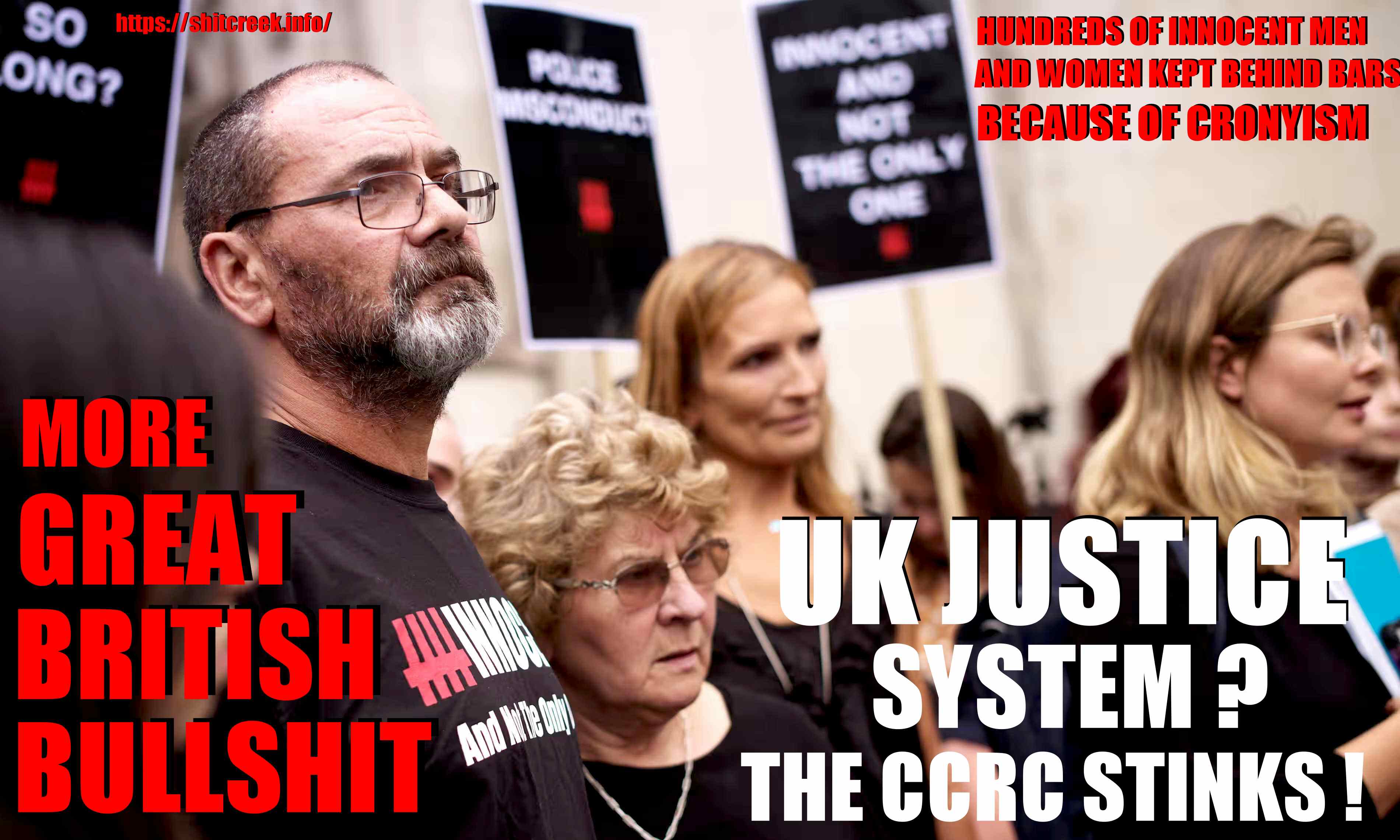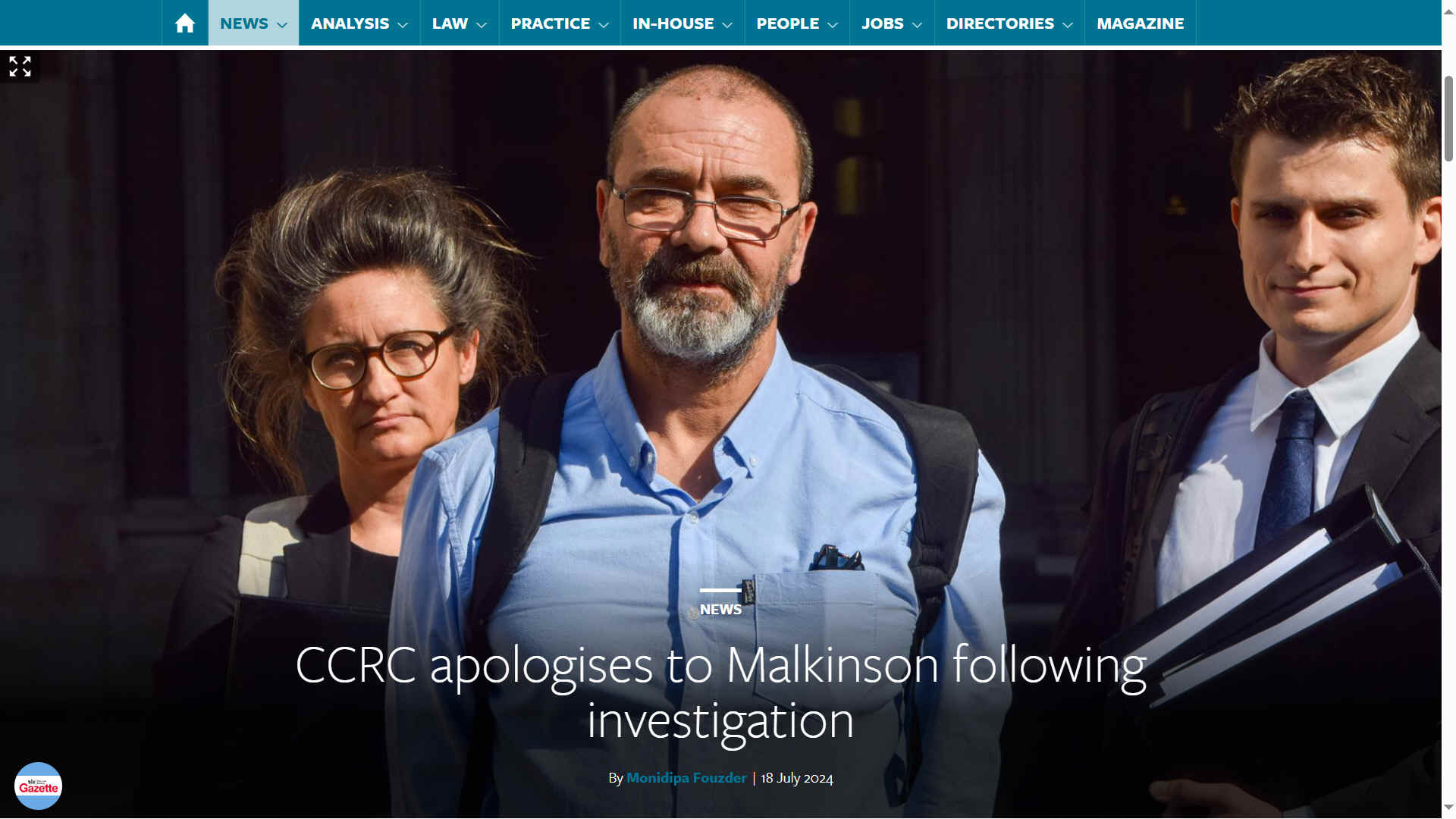|

It
is alleged that the agenda of the CCRC is not to refer sexual cases back
to the Court of Appeal for fear of undermining the Justice System, where
Article 6 was violated in the Sexual Offences Act and Police Codes of
Conduct. Suspects are to be treated as guilty, with no need to look for
exonerating evidence at the scene of crimes. Especially important if the
police are themselves suspects for aiding and abetting planning crimes.
And their victim is an activist.
THE GUARDIAN 18 JULY 2024 - FOR MANY ANDREW MALKINSON'S CASE A SIGN THE CCRC HAS LOST ITS WAY
Those close to Criminal Cases Review Commission’s work hope review will pave way for change in leadership and purpose.
Andrew Malkinson had only just stepped outside the court of appeal last summer when he received a message of apology from Greater Manchester police. It was the force’s work that ultimately led to his wrongful conviction for rape, leaving him incarcerated for 17 years.
Malkinson was unimpressed by their late contrition, but there was another body that refused to apologise at all that day. Yet their work – or lack of it – prolonged his time behind bars by a decade.
The Criminal Cases Review Commission twice prevented Malkinson’s case being considered again by the court, even though it knew from 2009 that DNA implicated another then unknown man. It also declined to do further forensic testing and never once looked at the original police file.
These facts were known to its chair, Helen Pitcher, when Malkinson was exonerated last summer, but it took her another nine months before an apology came. Conceding that the commission had “failed” him, Pitcher said she had not been able to say sorry before seeing the findings of an independent review of its handling of his case.
Now that review by Chris Henley KC is finally in the public domain – and it makes for uncomfortable reading for the CCRC.
Henley’s report shows in excruciating detail the many mistakes made by those tasked with considering his case over three separate applications. Perhaps the most damning insight is how close they came to rejecting his application in 2022, despite new evidence, had an alternative suspect not been found.
Pitcher is now very unlikely to survive the crisis. The new justice secretary, Shabana Mahmood, said on Thursday Pitcher was “unfit to fulfil her duties as chair” and that she had begun the process to seek her removal.
In the weeks after Malkinson was cleared, when questions were being asked about her leadership, the Guardian revealed that Pitcher was in Montenegro promoting her property business. The Montenegro property directorship is one of at least eight jobs that Pitcher holds in addition to chairing the CCRC, including being a non-executive director of United Biscuits. She also chairs the judicial appointments commission, which many have said could be a conflict of interest, given the CCRC’s role in holding the appeal court to account.
But as a part-time chair, Pitcher is not the only member of the leadership team who will now face scrutiny. Many of those closest to the CCRC’s work believe that Malkinson’s case is a symptom of a body that has lost its way. They hope that this review could pave the way for a change in leadership and purpose – as well as better funding.

A
STAR - Chris Henley KC is part of all that is good within the British
criminal justice system.
According
to the Mountford Chambers website, Chris Henley KC is one of the busiest criminal silks in the country, highly regarded in all areas of serious crime, particularly murder, fraud and terrorism. His work ethic, total commitment, empathetic and tenacious approach to all his cases has marked him out from his earliest years in practice.
He has appeared in many leading cases over the years including the 21/7 terror attacks, the Damilola Taylor trial, the Daniel Morgan murder trial, the Jemma Beale trial, the ‘Babes in the Wood’ perjury trial and many cases prosecuted by the SFO. He acted for the Trustees of the Didsbury Mosque/Manchester Islamic Centre at the Manchester Arena Inquiry.
Chris is a highly effective, intelligent advocate, with a confident, assured manner. He gets to grips with the most complex cases very rapidly, distilling the key issues and offering strategic advice at an early stage, often pre-charge. He is approached to appear at inquests, professional disciplinary hearings, and to provide advice to individuals facing a very wide range of criminal allegations. The Criminal Cases Review Commission has engaged him to lead the review of the Andrew Malkinson case.
In 2018/2019 he was chosen by criminal barristers across the country to lead the Criminal Bar Association during one of the most challenging periods in the profession’s history, achieving the first fee rises for defence and prosecution advocates for 20 years, and securing the Government’s commitment to the Bellamy Review of Criminal Legal Aid (CLAR) which ultimately resulted in further increases to fees of 15%.
The former solicitor general and
Conservative peer, Lord Garnier, said: “Clearly, the Malkinson case has woken up a lot of people from outside the criminal justice world to the existence of the CCRC and what it does and what it has all too frequently failed to do.”
Garnier, who co-chaired a Westminster Commission into the CCRC, said he hoped for radical changes to the organisation.
“I think it needs new leadership. I think it needs less timid leadership, I think it needs more full-time staff as opposed to fee-based staff who take on a case or deal with work on a day rate. Before, they had people on salaries with pensions who, I suggest, had a longer corporate memory of what had happened in the past.”
The CCRC was established in 1997 to replace a system where only the home secretary could sign off referrals back to the appeal court, a situation blamed for notorious wrongful convictions such as the Birmingham Six and the Guildford Four, which languished for so long without prospect of justice.
For it to fulfil its role it needs to prove it is investigating and uncovering injustice as well as referring cases back for appeal when evidence is presented to it.
One of the more damaging details is that in all three of Malkinson’s applications, which spanned more than a decade, commissioners failed to request the original police file, resulting in little scrutiny beyond the prosecution version accepted in court.
It was Malkinson’s team at the charity Appeal who uncovered the undisclosed criminal past of key identification witnesses, discovering that one was a long-term heroin addict who came forward to help only when he was arrested for another crime.
David Jessel, who spent 10 years as a commissioner at the CCRC until 2010, was concerned about the repeated lack of scrutiny of the original file. “It’s crazy really, because the court paperwork file is just an explanation of why the person is guilty. You’ve got to dig deeper if there’s a sniff of a miscarriage – otherwise you’ll get nowhere.”
Jessel believes it is one of several signs that the CCRC has lost its way. “I think absent is the critical mass of curiosity, authority, experience and expertise represented in the early days of the CCRC’s full-time commissioners working with and inspiring a staff recruited for their ambition for justice.”

Who
is the criminal, the police who gained the fraudulent conviction, Helen
Pitcher for burying (not looking for) the evidence that could have freed
Mr Malkinson ten years earlier, or the Government for not scrapping a
system that is open to corruption? A simple apology for taking 10 years
from a life is far from sufficient by way of compensation. Henry the
Eighth would have loped off her head.
THE INDEPENDENT 18 JULY 2024 - WRONGLY JAILED ANDREW MALKINSON 'COULD HAVE BEEN FREED DECADE EARLIER'
Andrew Malkinson, who was wrongly convicted of rape and jailed for 17 years, was “failed” by the Criminal Cases Review Commission and could have been exonerated almost a decade earlier, a review has found.
The CCRC “obstructed my fight for justice and cost me an extra decade wrongly imprisoned”, Mr Malkinson said in light of the findings, as he called for a complete overhaul of the body and repeated demands for its chairwoman Helen Pitcher to be sacked.
Justice Secretary Shabana Mahmood said Ms Pitcher is “unfit to fulfil her duties” and she is seeking her “removal from that position” in the wake of the report.
His 2003 conviction was quashed last summer after years protesting his innocence.
He and legal charity Appeal applied for his case to be reviewed by the CCRC in 2009 but at the conclusion of its review in 2012 the commission refused to order further forensic testing or refer the case for appeal amid concerns over costs.
A second application was rejected in 2020.
This report lays bare how the CCRC obstructed my fight for justice and cost me an extra decade wrongly imprisoned.
Crucial DNA evidence had been available since 2007 but no match was found on the police database at the time.
Last year officers arrested a new suspect on suspicion of the July 2003 rape after the discovery of the new
DNA evidence in the case. The 48-year-old man from Exeter has been released under investigation and Greater Manchester Police (GMP) said a file has been passed to the Crown Prosecution Service for consideration.
Chris Henley KC, who was drafted in by the CCRC to carry out the review, laid bare a string of “serious” failings and missed chances to correct the miscarriage of justice as early as 2009, including revealing the body had even considered rejecting requests for a referral to the Court of Appeal for a third time.
Making nine recommendations for improvement in his report, published on Thursday, he said: “The CCRC failed him. It required Appeal to obtain the new DNA evidence that ultimately resulted in the further work that led to the referral by the CCRC. It would not have happened otherwise.
“The opportunity to have this case referred in 2009 was missed, and a further opportunity to look again at the DNA evidence when the second application was received in 2018 was not taken.”
Referring to Appeal’s later requests to re-test samples in 2019, he said: “I have seen nothing to persuade me that the CCRC would have independently considered that retesting was justified or had any prospect of producing anything new which might call into question the safety of the conviction.”
Mr Malkinson’s legal team previously discovered striking similarities between his ordeal and the earlier CCRC case of Victor Nealon, whose 1997 conviction was overturned by the Court of Appeal in December 2013 after new DNA evidence was unearthed.
Mr Nealon’s case “undoubtedly bore similarities to Mr Malkinson’s case”, Mr Henley said, adding: “In my view Mr Malkinson’s conviction would have been quashed almost 10 years earlier than it was, if the Nealon judgment had been properly understood and followed.”
Mr Malkinson said: “This report lays bare how the CCRC obstructed my fight for justice and cost me an extra decade wrongly imprisoned.
“The finding that in 2022 the CCRC was considering rejecting my case for a third time, despite the compelling DNA evidence presented by my legal team, shows that the body is biased through and through. It needs to be torn down and completely rebuilt.
“If Helen Pitcher and her leadership team won’t resign after a scathing report like this, they should be sacked.”
James Burley, who led legal charity Appeal’s investigation into Mr Malkinson’s case, said the CCRC was a “broken safety net” as he branded the report “utterly damning”.
“The new Justice Secretary should bring in a fresh leadership team at the CCRC that is serious about rooting out wrongful convictions”, he added.
Ms Mahmood said: “It was sobering to read Chris Henley KC’s findings. My thoughts are with both Andrew Malkinson and the victim of this horrific crime.
“Having studied Chris Henley’s report closely, it is my firm view that Helen Pitcher is unfit to fulfil her duties as chair of the
CCRC. I have therefore begun the process to seek her removal from that position.”
Ms Pitcher offered Mr Malkinson an “unreserved apology” in April when she received the findings of the review and said it was “clear the commission failed Mr Malkinson”.
“For this, I am deeply sorry and wish to offer my sincere regret and an unreserved apology on behalf of the commission,” she said.
“Nobody can begin to imagine the devastating impact that this wrongful conviction has had on Mr Malkinson’s life, and I am deeply sorry for the additional harm caused by our handling of the case. On behalf of the commission, I offer my deepest regret.”
In response to the report, the CCRC said “we will learn from the mistakes that were made”, adding: “Mr Henley’s recommendations will be acted upon, and work to address them has already started.”
A separate inquiry ordered by the previous Government into Mr Malkinson’s case is ongoing.

A
barrister himself, Sir Keir Starmer will know how awful the CCRC Report
is, and the impact on the British justice (or lack of) system. His
Cabinet has a high proportion of legally qualified staff. We hope that
the Criminal Cases Review Commission is either scrapped or forced to
refer older cases that they have no reviewed properly, back to the Court
of Appeal.

LAW SOCIETY GAZZETTE
The chair of the Criminal Review Cases Commission has unreservedly apologised to Andrew Malkinson, who spent 17 years in prison for a rape he did not commit, after a KC-led review found the commission failed him. This afternoon, lord chancellor Shabana Mahmood said she has begun the process to remove Helen Pitcher as the commission's chair.
Malkinson’s first two applications for the CCRC to use its statutory powers to refer his case back to the Court of Appeal were refused. The third application resulted in a referral to the Court of Appeal in January 2023. Six months later, his conviction was quashed.
The CCRC commissioned Chris Henley KC to review the organisation’s handling of the case. Henley’s 130-page report was published today.
On the first application, Henley said there was a ‘complete failure to get to grips with’ the potential significance of new DNA evidence. On the second application, which charity APPEAL submitted on behalf of Malkinson, Henley said it was disappointing that the CCRC did not set up a meeting to understand what APPEAL was proposing to do in relation to fresh DNA testing.
In a statement, Henley said: ‘Mr Malkinson spent many years in prison fighting this appalling miscarriage of justice. In 2009 he turned to the CCRC but they failed him. Lessons must be learned. It is almost impossible to believe that this is the only case that has not been handled properly. The CCRC must make every possible effort to identify other applications where mistakes might have been made, and immediately implement the recommendations made in my
report.’
CCRC chair Helen Pitcher said: ‘Mr Henley’s report makes sobering reading, and it is clear from his findings that the commission failed Mr Malkinson. For this, I am deeply sorry and wish to offer my sincere regret and an unreserved apology on behalf of the commission. I want to assure everyone of our commitment to learn from this. Mr Henley's report includes nine recommendations, and the commission has already begun work to implement them.'
Henley's findings have prompted calls for the CCRC to be overhauled.
James Burley, who led APPEAL's investigation into the Malkinson case, said: 'No one can doubt now that the CCRC is a broken safety net which sets the bar unreasonably high for innocent prisoners trying to clear their names. The CCRC must be completely overhauled.'
Hickman & Rose solicitor Toby Wilton, who is representing Malkinson in a public inquiry on his wrongful conviction, said: 'It is vital that the CCRC is held to account for its shocking failures in this case and completely overhauled.'
Mahmood said this afternoon: 'It was sobering to read Chris Henley KC’s findings. My thoughts are with both Andrew Malkinson and the victim of this horrific crime. Having studied Chris Henley’s report closely, it is my firm view that Helen Pitcher is unfit to fulfil her duties as chair of the CCRC. I have therefore begun the process to seek her removal from that position.'
According to the Guardian, Pitcher has rejected calls to resign. [She probably,
allegedly, needed the income to underpin her overseas business
aspirations, and did not want to rock the boat.]

How
Helen Pritchard thinks a simple apology is sufficient for causing Andrew
Malkinson to lose another ten years of his life. Ten years on top of
seven years, because Greater Manchester police decided to frame him up,
is an appalling indictment for the British justice system.
|




